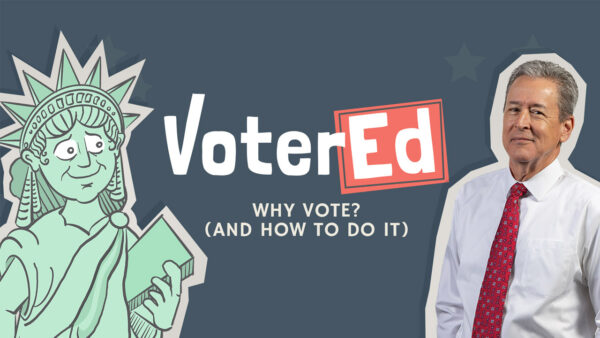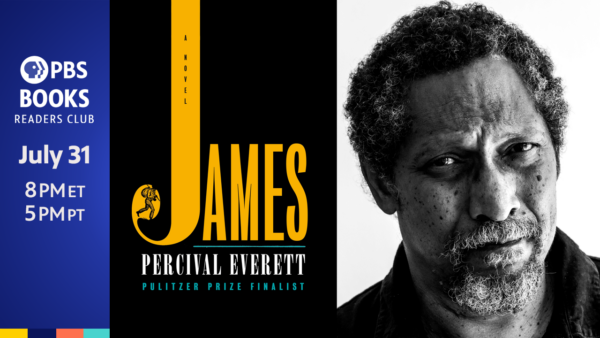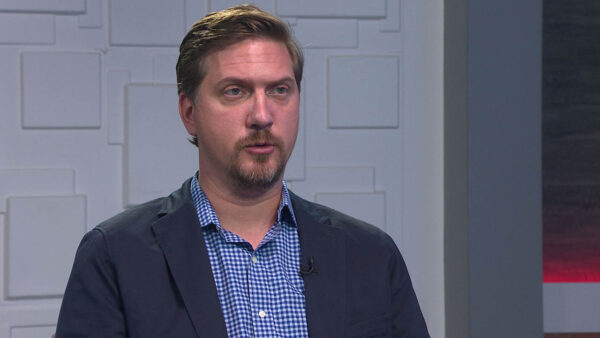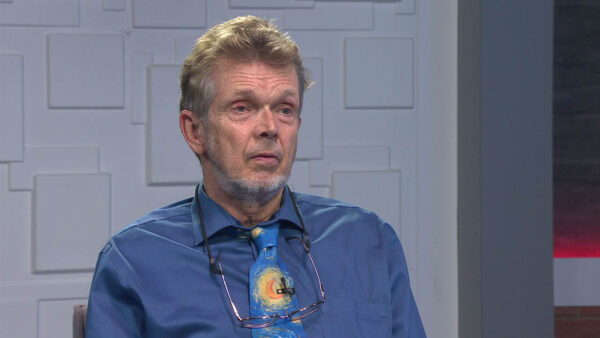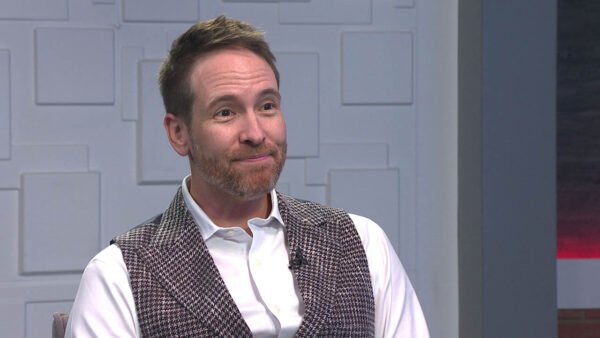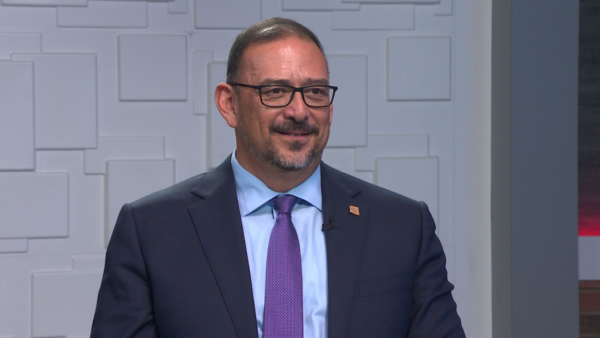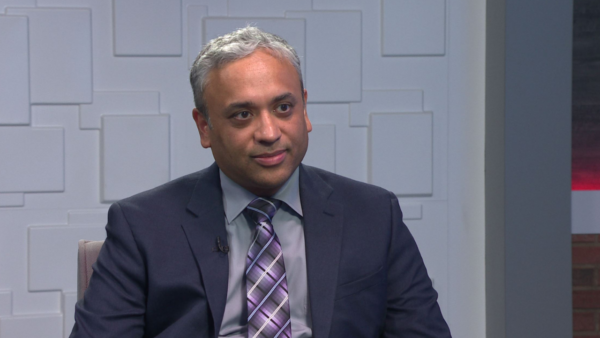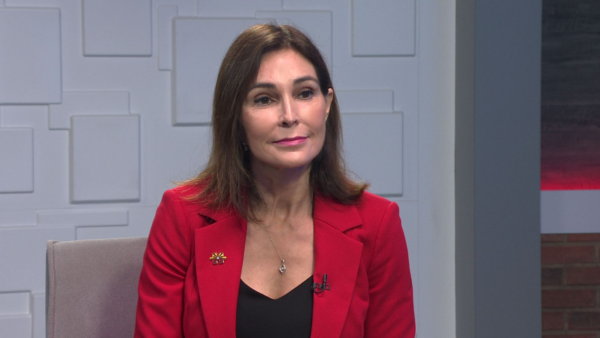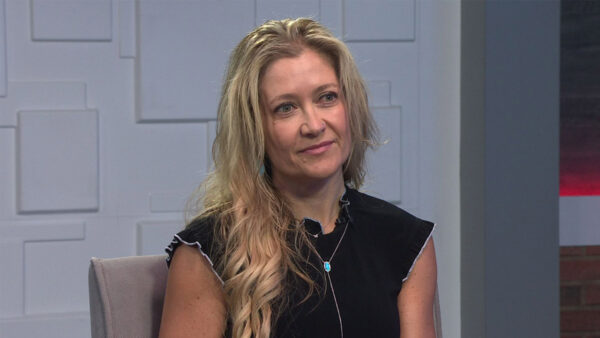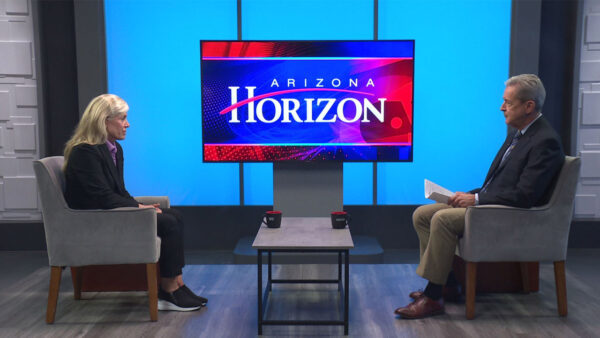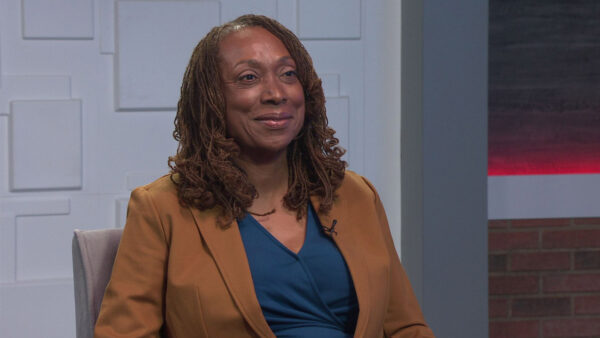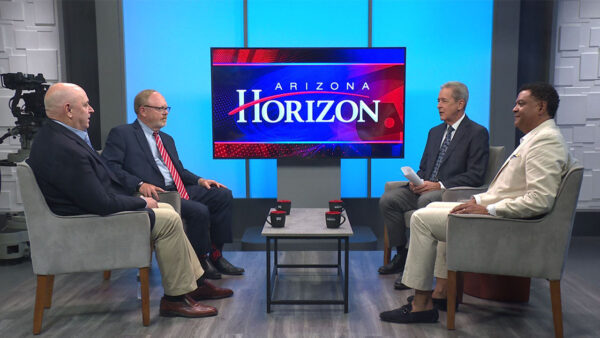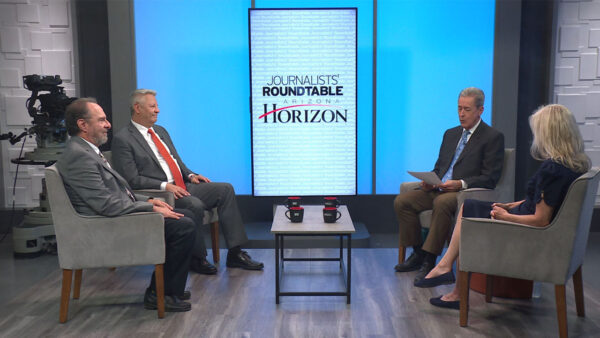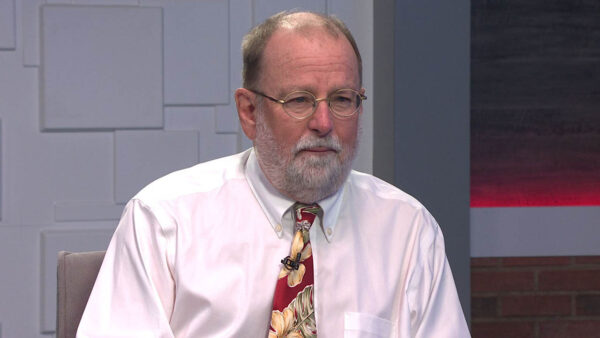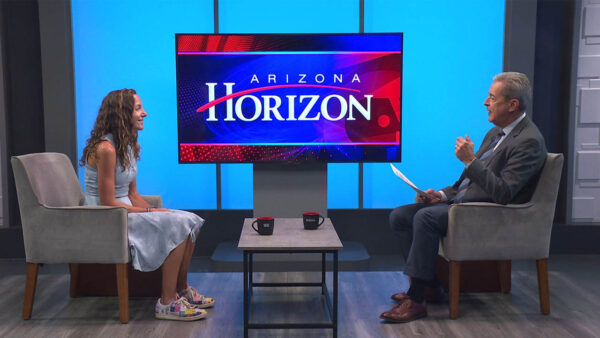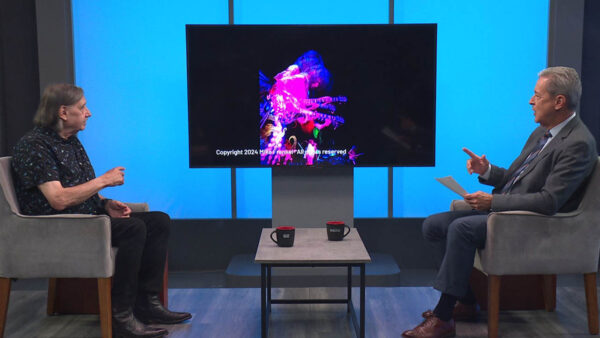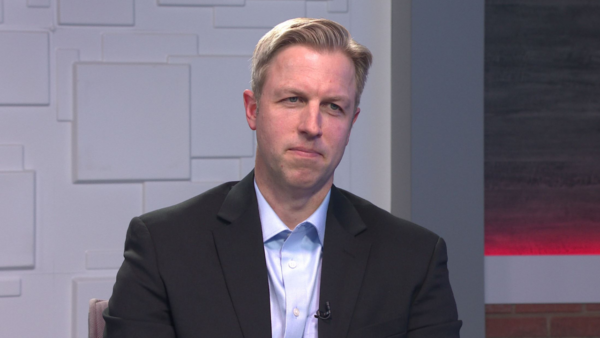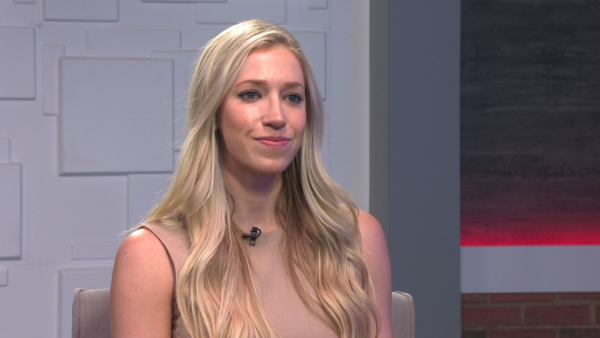The state’s business community would like to see tax breaks and revisions of the state employer’s sanctions law this upcoming legislative session. Glen Hamer of the Arizona Chamber of Commerce will discuss the business community’s legislative agenda.
Ted Simons:
Tonight on Horizon, state representative Russell Pearce is proposing five more bills dealing with illegal immigration. He'll be here to tell us about them. And the business community holds its annual luncheon to talk about its legislative agenda. Learn more about what business leaders would like. All that's next, on Horizon.
Announcer:
Horizon is made possible by contributions from the friends of eight, members of your Arizona PBS station. Thank you.
Ted Simons:
Hello and welcome to horizon, I'm Ted Simons. State Representative Russell Pearce has led the way in tough measures dealing with immigration. This legislative session is no different. Pearce will introduce five bills that are bound to cause controversy. One would deny birth certificates to babies unless at least one parent can prove citizenship. Another would charge illegal aliens with trespassing. A third would require proof of legal residency to register a car. The fourth would deny worker's comp benefits to illegal aliens hurt on the job. Finally, Rep. Pearce has a bill that would bar cities from prohibiting officers to ask about immigration status. Here to talk about his bills is Representative Russell Pearce.
Ted Simons:
Good to so see you. Thank you for joining us.
Russell Pearce:
Thanks for having me.
Ted Simons:
Before we get to the individual bills, employer sanctions law so far it's in effect, it's moving along here.
Russell Pearce:
It is the law.
Ted Simons:
Are you seeing any effect so far?
Russell Pearce:
Absolutely. In fact it gets reported every day. Just after my home alone, three businesses that catered to illegal immigrants have closed their doors. You know, we know the impact. People have to recognize jobs is the number one lure, it's been against the law. It's been a felony since 1986 to hire an illegal alien. I think that's almost enough time for employers to get their act together. But because of the federal government being AOL, away without logic on this issue, malfeasance on their part, we've had employers that have ignored the law like it's not the law. Well, enough is enough. The impact is so huge in billions and billions of dollars in -- billions and billions of crime. Yeah, most of them are not bad people. This isn't about all them being bad people. They're illegal. They have no right to be here. But you can't ignore what comes with it. Heritage foundation, four times as likely to use social service programs. The crime, Arizona is number one in crime, Home invasion, carjacking, identity theft of the world. Congressional report 9,000 Americans killed every year at the hands of ill yell aliens. That's a congressional report. So you got to do something. Jobs are the number one lure. You can't justify the damage to the citizens and the cost to society because they won't prophet over patriotism. They simple, At the bottom line they don't care how much damage occurs as long as they get theirs.
Ted Simons:
So you have seen some effect so far. What do you want to see now as far as the legislative process in terms of tinkering or fixing the bill as it stands?
Russell Pearce:
Right now there's some things that were taken out in the senate that ought to be back in. And employers want this, too. That is going after the underground, the cash economy that avoid tax. Again, unfair competition to the honest business person. So that will be back in the bill. We'll do a little clarification on-site specific. I think it's clear in the bill. We'll make it clearer, though. That's the nice thing about legislation. We can fix things or improve on things. There's not wrong with the bill. Judge Wright made that very clear in his ruling when he turned down the temporary restraining order. He virtually said this is a great bill and it protects those that probably have the need of government protection more than anybody else. The most vulnerable among us. And then you've got George Moorehouse, from the Harvard University, the economic impact of $1.4 billion a year and the impact of suppressed wages to those same folks, which cod fight what judge waste said. Judge Wait made a food point He made -- Waite said. He said their right to break the law without taking into consideration the impact to the citizens of Arizona for these violations is outrageous. It was a great ruling. Clearly we will prevail in the court system. It's a good bill and fair and legal. That's what it's called, the fair and legal employment act. We will do some more improvements on it to make it clearer.
Ted Simons:
As far as the legislation you'll be looking at for this session, I think the one that's causing the eyebrows to raise is not automatic citizenship to babies born in this country unless one parent can prove legal status. Let's say it gets through, becomes law. Can it survive a court challenge?
Ted Simons:
We've been through this many times. We say we'll prevail with 2779. It's very clear it's within the purview of the states deal with this. We had seven lawsuits. Prevailed in all seven lawsuits. Same arguments used. I have to admit on this one it's a little more fragile than the others because the fact it arrives from a misinterpretation of the 14th amendment. People think those born here have legal status to be citizens. Yet if you read the14th amendment, they miss five critical words. They say born or naturalized. It's born or naturalized and for whom we have jurisdiction over. In fact, what's really interesting, in the 1800's, in the late 1800's and three times in the early 1900's, congress had to pass an act to declare citizenship to the native Americans. There's no question where they were born. Here. It has nothing to do with where you're born. Has to do with jurisdictional responsibilities. In the debate they made it clear it didn't apply to aliens. It's an unconstitutional -- you mentioned jurisdiction. Anyone who is here in America, though, does have jurisdiction, do they not?
Russell Pearce:
Not under that definition, no. You don't have jurisdiction. The constitution does not apply. In fact there's an interesting court ruling in the United States supreme court. An unusual 9-0 landmark decision in Mueller versus Benan. Not dealing with these issues but the pre-emption issue, jurisdictional issue. The ninth circuit court, most overruled in the nation, ruling on illegal aliens they had fourth and 14th protection of the constitution. The Supreme Court slapped the ninth circuit court down and said absolutely not. They have intentionally broken the law and they have no fourth and 14th amendment rights. So I think it's very clear. That was an unusual 9-0 landmark decision.
Ted Simons:
I want to bring that up regarding jurisdiction. You're talking about a variety of other things aside from status. You talk about committing crimes here, people that have already committed crimes and are incarcerated here. Again, here legally, illegally, whatever. That jurisdiction is still there.
Russell Pearce:
It's not the same. That's not jurisdiction. You can't commit crimes here. That's not a matter of a jurisdictional issue. Like I say, if they went back to rebate the 14th amendment they made it clear it didn't apply to visitors and aliens. If you're visiting here -- you have a legal status here and are a diplomat or wife of a diplomat and you're in the hospital bed and you just have a baby? That's not a citizen. Yet, an illegal alien in the bed next to you? We're going to call that a citizen? This isn't about children. This is about the rule of law. And people who come here cannot be rewarded. They do it -- and by the way, sometimes very intentionally get lots of stories because they know that it creates a wedge. They know that it gives them certain benefit rights as they have these children. It's just wrong. You can't reward law-breaking. You just can't. I love these children. I understand. But they have a country.
Ted Simons:
I want to clear something up here as far as the babies are concerned. You're saying unless one person has legal status or is a citizen?
Russell Pearce:
No, citizen.
Tend Simons:
You want citizenship.
Russell Pearce:
Absolutely. That's what Canada does the United States does. You don't go down to Mexico and have a baby and have it a Mexican citizen. They don't allow, that either. This is consistent can every country recognizing sovereignty. We have a constitution that I think makes it clear. In fact in the bottom of that it says congress will regulate this. Again congress, they have a 11% approval rating? Again they continue to fail the American people to make sense -- enforce our laws, do what they promised to do.
Ted Simons:
What is your game plan here as far as getting these things through? Let's say they get through and vetoed or don't get through the house or senate. If one of these five don't make it are you going on initiative process? What's happening here?
Russell Pearce:
Let me be very candid about the 14th amendment one. As passionate as I am about it. The congress wrong. I'm dealing with some congressmen now that are working on this issue. I may defer to them. The appropriate place to fix that is in congress. I admit that. But people ignore states rights. States have an inherent authority to enforce federal law. Inherent authority. If congress didn't want them to enforce federal law they have what is called preliminary powers where they can pre-empt states for doing that. That's never been done on the irrigation -- immigration issues. We have an inherent authority. We have a constitutional responsibility to our citizens; they have a constitutional right to expect the laws to be forced enforced. But to your question, there is an initiative process. We love our citizens. And you talk about polls. You can't get threes these through the legislature, can't get the governor to sign this. She of our bills, mostly mine. Last November, we had a poll last November. Called an election. Hundreds of thousands of people showed up to vote. The margin of error is zero. They passed four ballot propositions by the average of 75%. We know where Arizona is at. And it's about time we stand up for the citizens and the legal residents of this country and recognize our responsibility.
Ted Simons:
It sound like you would go that route, though.
Russell Pearce:
Or referendum. It doesn't have to be a citizen's initiative. Two ways to get something on the ballot, through the citizen's initiative process where we gather signatures, a lot of work, a lot of effort, should be high bar. We're a republic, not a democracy. It should be high bar. But there are times to utilize that process so our founders put it new our constitution.
Ted Simons:
You are obviously are very passionate about this, you've taken the lead. You're passionate about this. I know you don't agree with representative flake what he's doing on this issue. There was talk of you taking him on. Now the talk has stopped. What happened?
Russell Pearce:
The time something not good for me and my family. I'm not a Washington, D.C. kind of guy. Is there a time, maybe? Maybe. But the work's not done here. And again, recognizing state's rights and the influence we've had. You know Arizona has had more influence on national policy than any other state in the nation by far. Starting with prop 200 that I wrote, requiring proof of citizenship to register. i.d. at the polls and proof of eligibility before you get taxpayer benefits, which by the way are all illegal under federal law. We have to pass law to enforce law it seems like because everybody wants to ignore it before you make is more local. That's too bad. Enough is enough. It's time to stand up for America. The rule of law has to be established. We love folks. But we must recognize we have a responsibility to honor our laws and respect our laws.
Ted Simons:
So Washington will have to wait for Russell Pearce.
Russell Pearce:
Well, if ever it's an issue. But yes, sir.
Ted Simons:
And thank you so much for joining us. We appreciate it.
Russell Pearce:
Well, thank you. I did want to talk about the employer -- the elimination of sanctuary policy if we had a chance. They're illegal, officer Erfle officer martin, Office Adams have been killed because where they are not allowed to enforce their law. It's malfeasance. They ought to be removed from office when they have those policies.
Ted Simons:
State business leaders held a luncheon earlier this week to outline their legislative agenda. The Arizona chamber of commerce and industry's luncheon touched on several points, including fixes to the employer sanctions bill and tax breaks. I'll talk to the president of the chamber about the agenda, but first, let's hear comments from the luncheon from state legislative leaders on the state's budget deficit. Republicans see it as an opportunity for change. Democrats want to protect the social services.
James Weiers
: we have opportunities to do a lot of good things. There's a lot of people depending that we make those right decisions. We cannot continue the same old way that we've been doing. In the times past things were great. We had almost $2 billion in unanticipated revenue a couple years ago. And we spent it. As we will spend every sent of money that comes our way in the legislature. It just goes without saying it's going to happen. How you spend that money is really the issue. And that's got to be the question that needs to be answered. But when we have the chance this time, is to look at the way the government is ran, we had the opportunity to maybe come back and retool, maybe government but in no way do we want to hurt the people that depend on those very services and make Arizona a great place to raise their family.
Marsha Arzberger:
I do feel I need to make some comments on items in the chairman's proposed tax budget. There's one item that concerns me and I do want to point it out. In various places in the document I read, "Eliminate small and various assistance payments to people with an unemployable disability, to poor, disabled, people, 1300 people. Cut seniors from home care services. Cut the elderly from -- that's 600 elderly. Cut that home care service. Cut funding for senior food baskets. Cut the dental care for the elderly in nursing homes. Cut healthcare for children of low income and no insurance. And by the way, several of the -- cutting federal fund that come our way for those programs in large amounts that the state contributes. Cut the low income pregnant level program affecting 677 women statewide. "We may be talking about a budget but we're also talking about a society. And Americans don't like to see our elderly, our poor and disabled, going without food, or our children going without medical treatment. So I think those are specifically some items in the budget that perhaps should be dropped.
Phil Lopes:
We cannot, we must not, react to today's budget problems with a simple panic-driven, knee jerk response. We must stretch across to cover more expenses. So we must not stifle economic growth with foolish restrictions on essential services to that vulnerable -- to those vulnerable people. We have a problem to manage, as the speaker alluded. And it is my hope and my -- I dedicate myself to making sure that as good stewards we manage that problem and we solve it expeditiously.
Tim Bee:
While we're looking at $1 billion deficit, I look at this as an opportunity to try and change the way that we do business once again. You guys know the drill. Every year we sit in the appropriations committee about two and a half months. The leadership comes together within the chamber to talk about what we're going to put together. Then we send the budget out somewhere around June 20th. And we cannot afford to do that this time. We've got -- with the deficit that's before us, with the importance of both the '08 and '09 budget we have to change the process. And so in December of this year we sat down as leadership and we talked about how can we change this to make it work better. And that is why today, one week before session is going to begin, our appropriations committees have already begun to tackle the '08 problem. The start of the regular session, the speaker and I will convene regular committee actions for the first week. The second week we will suspend regular committee actions. And for that week we will take what normally takes us two and a half months to get through, and we will have our Committees and our body focuses entirely on the '09 and '08 budget problems. And after that process is completed and the hearings have been done, we will take what normally starts in the middle of may to the -- middle of March to the end of March, and at the end of January we will already begin the budget negotiations that will take us to the solution.
Ted Simon:
Here now to talk about the business communities' agenda for the upcoming legislation session is Glen Hammer, president and C.E.O. of the Arizona chamber of commerce and industry. Glen, good to see you again. Thanks for joining us.
Glen Hammer:
Great to see you again.
Ted Simons:
Boy, the budget crunch. Let's get started right there and how it affects your agenda.
Glen Hammer:
It's a good question. Certainly we recognize that this is a difficult budget year. And all of the speakers at our legislative forecast luncheon acknowledged that. S still really a great opportunity. As representative Pearce mentioned, the government has been growing at a quite prolific clip over the last several years. And we're going to need to do some belt-tightening. We also believe, though, that it's very important structurally to make Arizona as competitive as possible. And that's why one of our top priorities is to make permanent a property tax cut. And that was enacted in 2006.
Ted Simons:
And I want to get to that in a second. The social services, though, that it looks like the governor and democrats are trying to protect, go into the quality of life file and the quality of life file is supposed to attract business in and of itself. How do you work that dynamic?
Glen Hammer:
Well, the governor and the Democrats in the legislature as well as the republicans in the legislature, I believe everyone agrees that cuts will need to be made. And the governor has offered a series of cuts. And the legislature has offered a set of recommendations. So everyone is on the same page. Cuts are going to have to be made. But they're just simply going to be some differences in terms of priorities. And we're just going to have to -- we're going to watch this very carefully so that the budget is balanced as the constitution requires but in a way that allows the state to continue to remain competitive.
Ted Simons:
You mentioned the temporary preliminary to property tax. It -- repeal to property tax. It looks like that's a major issue as far as your agenda is concerned. Why is it so important that that temporary repeal become permanent and why now with all these budget concerns?
Glen Hammer:
Well, we're not aware of any state or country on earth that has been able to tax its way into prosperity. In fact, if you look at the trend, whether it's Spain which has a socialist government or Kuwait or Bulgaria, these countries are reducing taxes. And we believe it would be a very destructive signal in a property tax cut that was enacted a few years ago came back and returned as a tax increase to business owners as well as residential property owners.
Ted Simons:
But is now the time to be talking about a permanent, especially considering budget short false. This was a three year repeal temporary. Why not wait it out?
Glen Hammer:
This is actually we would argue the best time to talk about it. Because businesses when they make investment, they look at tax structures. And the faster this is made permanent, the more valuable that this tax reductions would be. And again, with some of the other things that have been going on in the state of Arizona, we believe it's extremely important to send the signal out to all businesses in Arizona as well as all businesses outside of our borders that the state is still a very business-friendly environment.
Ted Simons:
Let's go to what representative Pearce and I were talking about quite a bit, the employer sanctions law. But the employer sanctions law in effect for a little bit here. Are you hearing stories, seeing things where it is affecting businesses?
Glen Hammer: Absolutely. I mean, the law is -- is damaging the amount of investment that's coming into this state. We know that it's going to harm the economy. The proponents of the law have even said that it will downsize Arizona. Every economist that I've -- that I've heard talk on this issue have said that it will harm the economy. It's a question of degree. And one thing I will say, it is encouraging that we're hearing a lot of lawmakers, including Mr. Pearce who mentioned a couple of areas that need to be revised. We're hearing from a lot of different lawmakers and interest to address certain aspects of the law. And we do take that as a positive development.
Ted Simons:
As far as those aspects are concerned, though, are there things -- if it goes through, if it survives the challenges and then the legislature starts tinkering and fixing, you've got. It what do you want to see tinkered with the most?
Glen Hammer:
Well, one aspect that we believe is very unfair is the aspect that allows for anonymous complaints. There should be a requirement that complaint be in writing, and there should also be legal reasons behind the complaint. We also believe it's very important for there to be a safe harbor in the law. And what I mean by that is that if businesses in good faith are complying, that should be. It because we know that for small businesses, an investigation into an unfair prosecution, even if they get off, that can be the death sentence in itself in terms of the cost of the legal action.
Ted Simons:
Okay. So get rid of that aspect. Real quickly here, I know that bonding for school construction is going to be very volatile. It already is. A lot of passionate opinions on both sides. Why is borrowing for school construction a bad idea?
Glen Hammer:
Well, I believe that -- I would answer that by saying that it seemed that everyone agrees that we -- that we need to cut spending. And the more spending that is cut, the easier it will be to balance the budget. It's also seems to be pretty clear that there is going to be -- there is going to be activity to withdraw funds from the rainy day fund. It's raining in sunny Arizona. I think when it comes to some of the issues regarding bonding for capital expenditures; I think everyone agrees you shouldn't bond for operating expenditures. There's going to be a lively debate in terms of what the state should do and what makes sense for the long-term health of this state.
Ted Simons:
As far as the chamber is concerned, what makes sense?
Glen Hammer:
Well, right now we certainly believe that there needs to be a great deal of paring down of the budget. We're exploring the other option. It's very clear that rainy day fund, there's going to be a pretty significant withdrawal. And in terms of debt financing, we've taken a very strong position certainly against using it for operating expenses. But first place that we really all need to focus on are the areas that we can cut in the budget. And we applaud the state legislature as well as the governor for rolling up their sleeves and getting started with that difficult and painful process.
Ted Simons:
The governor is using the -- we only have about 30 seconds here. The governor uses the word "irresponsible" especially as far as getting back this property tax. The repeal and making it permanent now. Why is it -- why is it again responsible policy now to do this in these troubled times?
Glen Hammer:
Well, I would first say that the governor and the state legislature have really done a great job over the last several years of improving the competitive tax climate of the state of Arizona. And we do not want to lose that momentum. And we also appreciate that the governor has certainly has not called for any tax increases to deal with this challenging situation as some of her colleagues have done in other states to incredible disaster. So this will be an interesting session.
Ted Simons:
All right. It sure will. Thanks you so much for joining us.
Glen Hammer:
Thank you.
Ted Simons:
All right.
Announcer:
The latest session of the state legislature starts next week. We will have a preview of some of the biggest issue. And what's ahead for Arizona senator John McCain after winning the republican presidential primary in New Hampshire this week. The journalist roundtable Friday at 7:00 on horizon.
Ted Simons:
And that's it for now. Thank you for joining us. I'm Ted Simons. You have a great evening.
Russell Pearce:State Representative;Glen Hammer:President and C.E.O. Arizona Chamber of Commerce and Industry;
